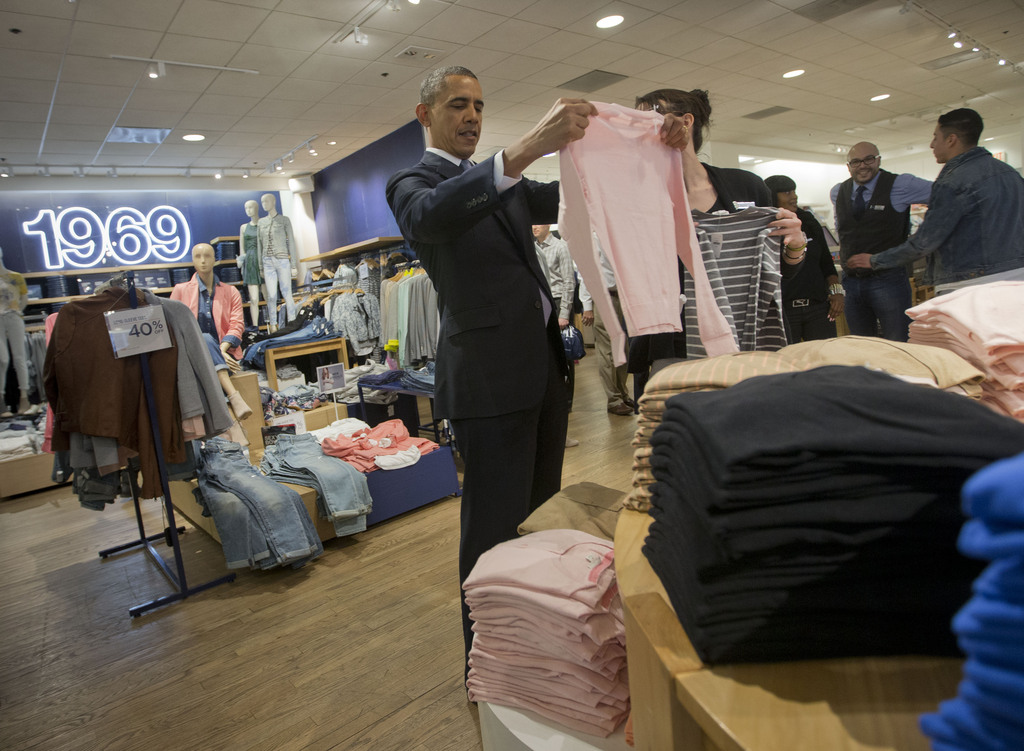The minimum wage makes a comeback

The debate on the merits of a minimum wage can be heard far beyond the borders of Switzerland, where voters will decide on May 18 whether to adopt a nationwide limit. Many western and emerging nations are also grappling with the issue.
There has been a flurry of recent interest in the issue of minimum earnings around the world. Across the Atlantic, US President Barack Obama has backed plans to raise the federal minimum wage level by 40% to $10.10 (CHF8.90) per hour. It is not clear whether the proposal will gain a majority in Congress, but the initiative is sending a clear signal.
“Give America a raise,” declared the president during his State of the Union speech on January 28, 2014.
In Germany Chancellor Angela Merkel announced in November 2013 that it was introducing a nationwide minimum wage – a concession to her centre-left Social Democrat partners in the coalition government.
In January this year British Chancellor of the Exchequer George Osborne declared his support for an 11% rise in the minimum hourly wage to return it to the level before the recent economic crisis. China also last year revised its minimum wage upwards by 18%.
The popular initiative on a minimum wage was submitted by the Swiss Trade Union Federation in 2012, with 112,301 valid signatures.
It calls for the introduction of a legal minimum wage of CHF22 ($25) an hour nationwide, which would make it the highest level in the world.
It demands that the federal government and the cantons protect rates of pay in Switzerland and promote the setting of minimum pay rates in collective agreements.
The government and a majority in parliament (composed of parties of the right and centre), recommend rejecting it. To be accepted on May 18, it has to win a majority both of the voters and of the cantons.
According to Sergio Rossi, an economics minister at the University of Fribourg, these announcements are the direct result of the financial crisis which hit hard in 2008 followed by the global economic crisis.
“The leaders of many countries are starting to realise that low salaries are damaging economic activity. Disposable household income seems to be determining long-term economic growth,” he declared.
As governments struggle to deal with public finances in the red, they have two options, said Rossi: “They can either increase taxes, which is never popular, or boost low salaries by reducing public spending in the social sector.”
Reducing inequalities
Stéphane Garelli, an economics professor at the International Institute for Management Development (IMD) in Lausanne, believes this renewed political interest for the minimum wage is the result of a “growing gap between rich and poor and increased awareness about the number of ‘working poor’ at the bottom of the ladder”.
This is a world where the richest 1% own 46% of wealth, or $110 trillion, said Garelli.
In February experts from the International Monetary Fund (IMF) declared social inequalities risked ‘cutting short growth’. International Labour Organisation (ILO) Director General Guy Ryder went further in a speech on January 24: “Inequalities lead to frustrations among the population and increase the risks of instability. Current problems in many countries are driven by feelings of injustice.”

More
How to live on less than CHF4,000 a month
A liberal idea
A minimum salary has been a regular theme at the ILO, but recent interest among governments is something new. Up until the start of the 1990s it was commonly accepted that a minimum salary could damage employment and hinder business competitiveness.
In 1994 American economists David Card and Alan Krueger published an important study which led to a change in thinking when they demonstrated a positive link between a rise in the minimum wage and increase in employment.
However, today almost all experts agree that it is very hard to prove a conclusive link between the two, whether positive or negative, as effects vary from country to country, which operate in an increasingly global economy.
What is interesting is that while the minimum wage debate is presently driven by centre-left parties and unions, originally it was the idea of liberals, explained Jean Batou, professor of economic history at the University of Lausanne.
“The idea didn’t come from the socialists but from liberal economists who in the 19th century acknowledged the market’s failure to give a minimum value to employment. For John Stuart Mill, one of the last great liberal economists, the introduction of a minimum wage into law should make work sufficiently attractive for employees,” he said.
Swiss exception
In 1894, New Zealand, facing a large influx of Europeans, became the first country to introduce a legal minimum wage. The idea then took off in other developed countries after a series of crises in the 1930s. Currently 21 of the 28 European Union member states have legal minimum wages.
“For those that don’t yet have a minimum wage, like Germany, Italy or the Scandinavian countries, general labour agreements cover most jobs. These also contain precise regulations concerning salaries,” said Batou.
So why hasn’t Switzerland followed this general trend up to now?
“During the 30-year period of strong growth after the Second World War, owing to a lack of manpower, salaries increased faster than demands from unions. There was also a strong belief in Switzerland that it was somehow different from other countries. People thought it was possible to get wage increases without union action,” said Batou.
The University of Lausanne professor said the union movement generally used to focus more on qualified male Swiss citizens. But these represent a decreasing percentage, unlike women and immigrants with fewer qualifications who work in sales, the service sector, as cleaners and in the hotel and restaurant industries, which also have a smaller union representation in general.
Unions say this is why this new workforce needs to be protected by law. After various attempts at cantonal level, including initiatives in Neuchâtel and Jura, Swiss unions launched an initiative for a nationwide minimum wage to be decided by Swiss voters on May 18.
(Translated from French by Simon Bradley)

In compliance with the JTI standards
More: SWI swissinfo.ch certified by the Journalism Trust Initiative












You can find an overview of ongoing debates with our journalists here . Please join us!
If you want to start a conversation about a topic raised in this article or want to report factual errors, email us at english@swissinfo.ch.